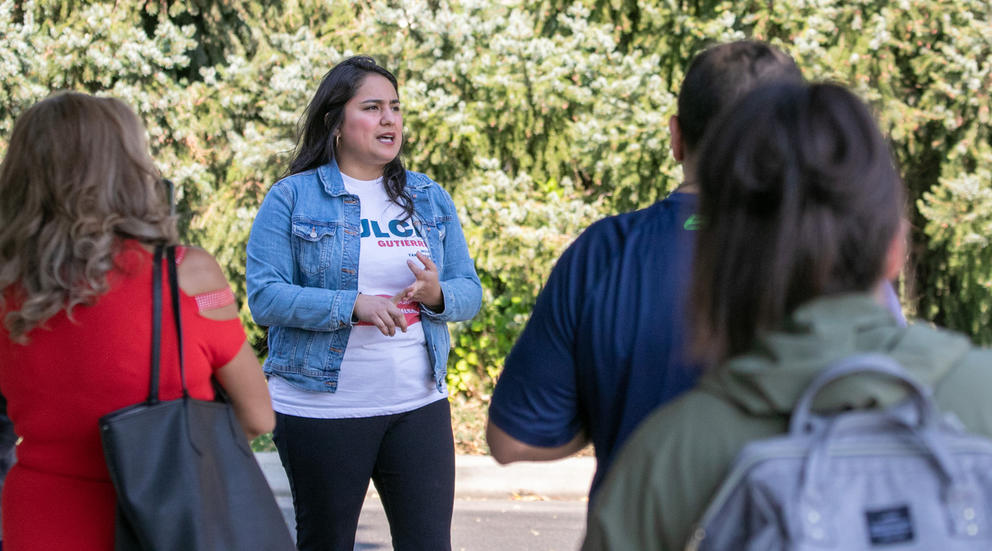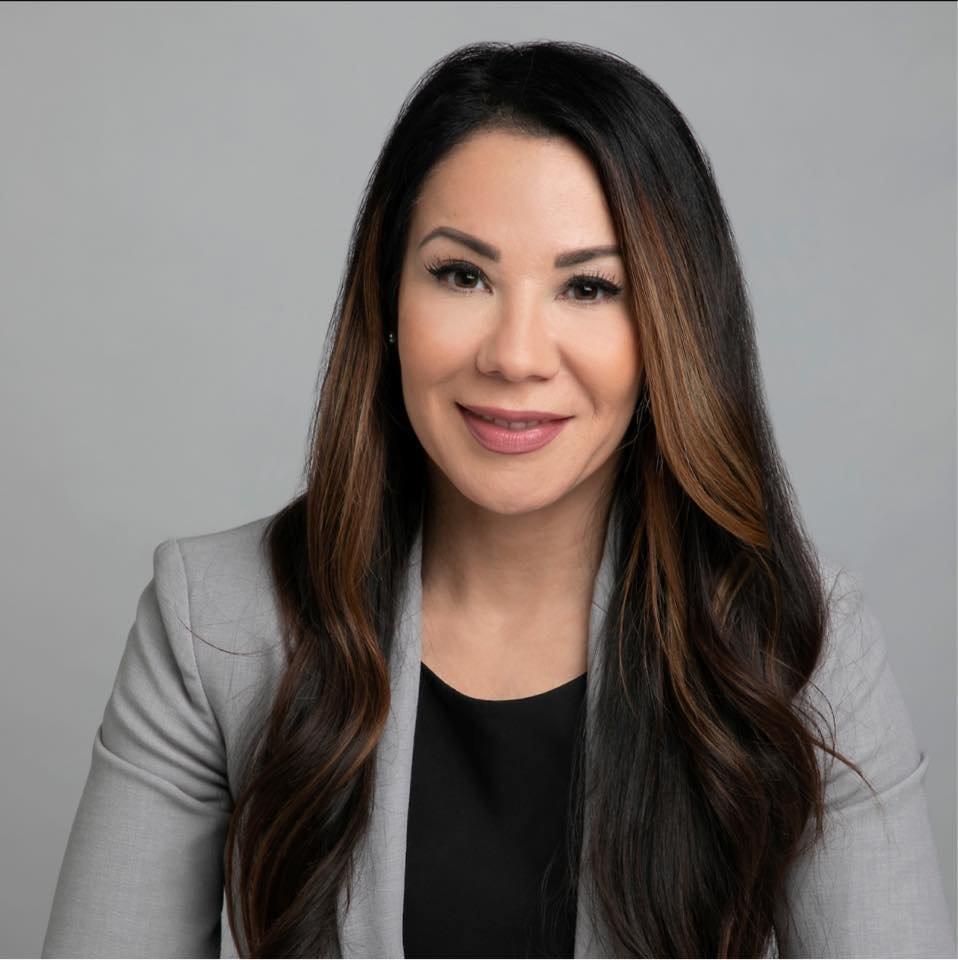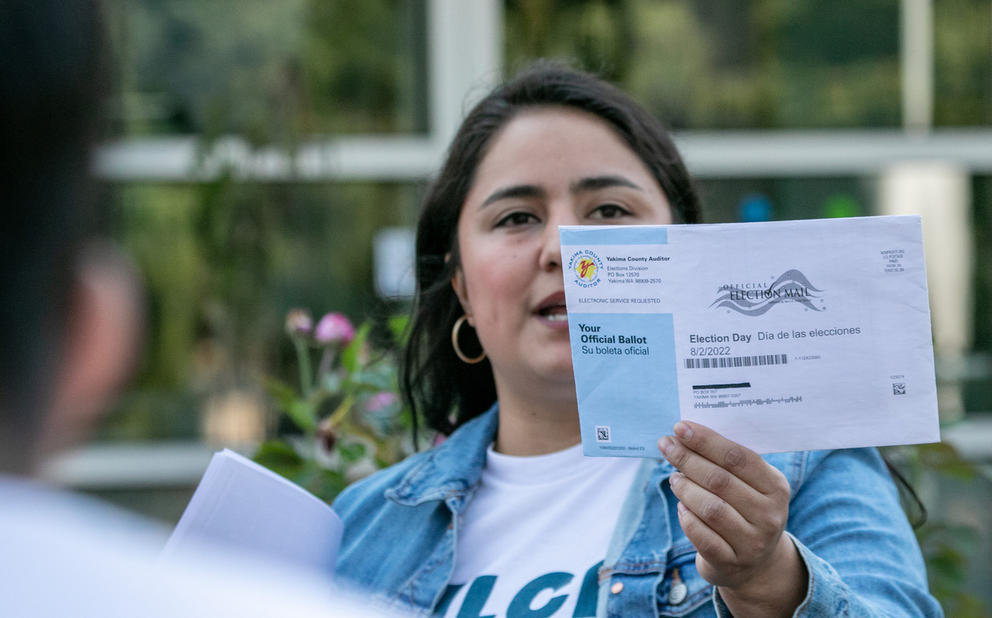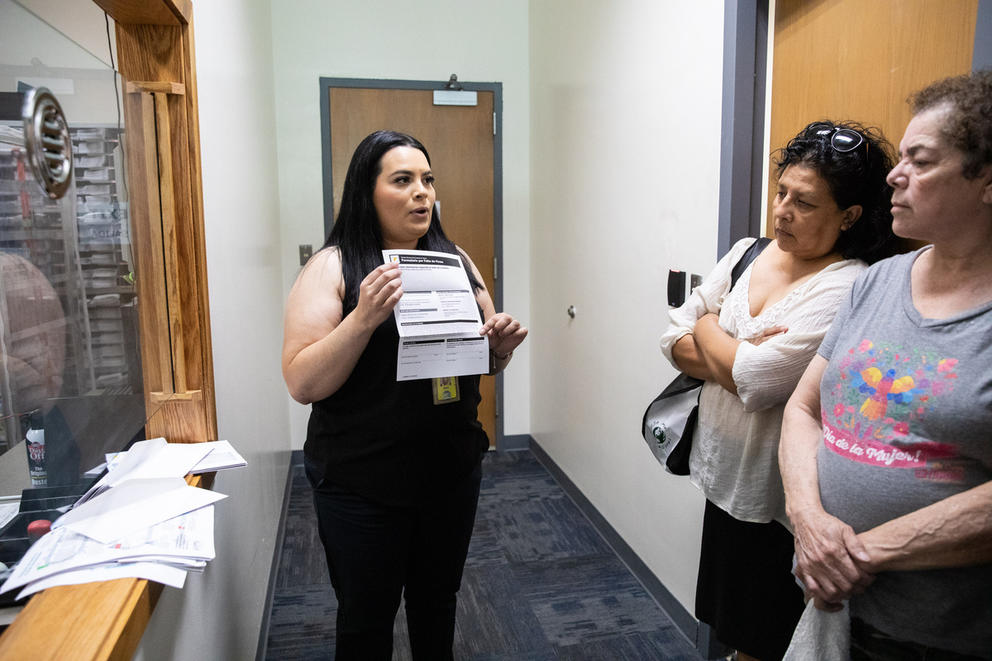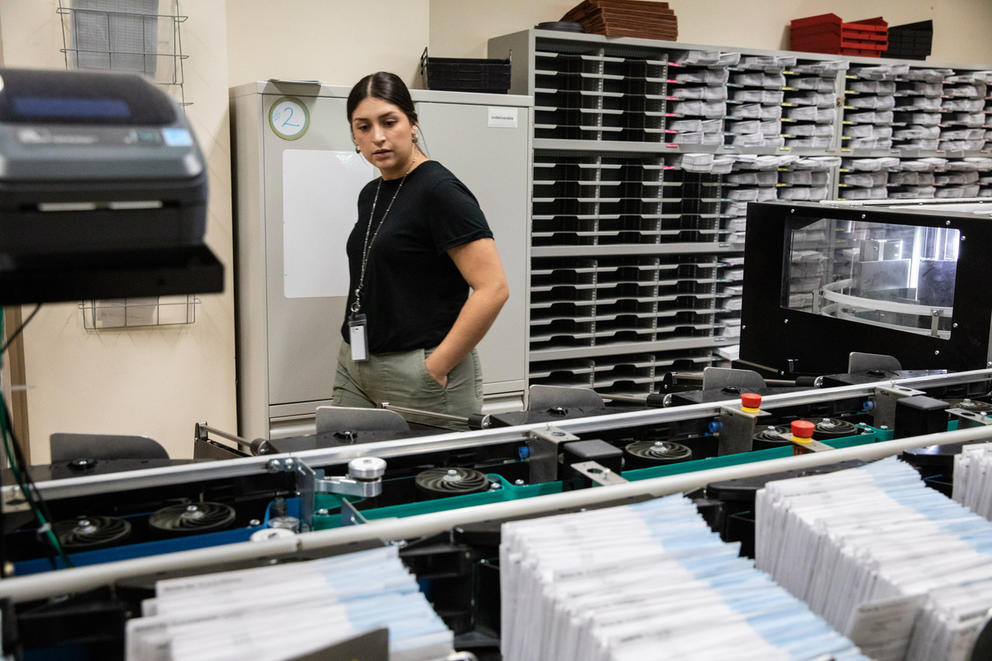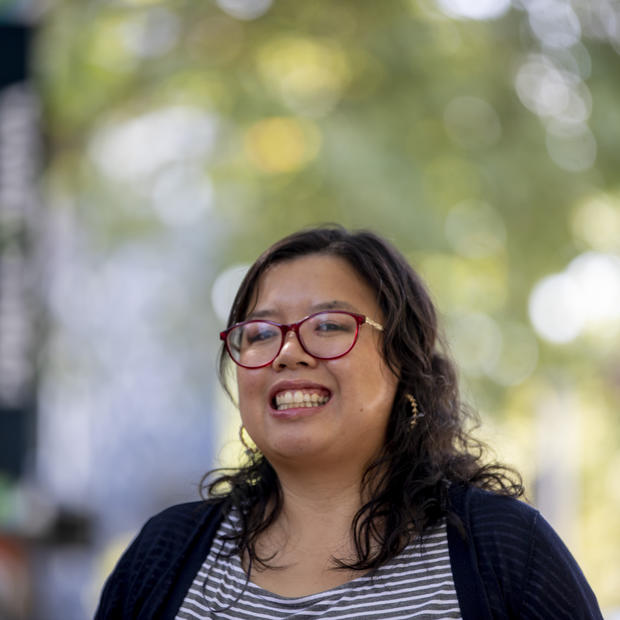These voters often are enthusiastic about seeing a Latina running for office, but many lack basic civics knowledge.
“I am building the vehicle as I am trying to drive it and building the infrastructure [for Latinx voters] as I'm trying to work [my candidate] platform at the same time, while my opponent doesn't have to do that,” she said.
Gutierrez made history when she was one of three Latinas elected to the Yakima City Council in 2015 — the first Latinas ever. Now the Democrat seeks to be the first Latina to serve on the Board of Yakima County Commissioners, which has been predominately white, male and conservative.
She is in good company: An increasing number of Latinas are running for office at the local, state and national level, seeking to address longstanding underrepresentation.
Leaders from both political parties — as well as civic organizations and activists — are looking to Latina candidates to energize voters who have been far less politically active than other demographic groups.
Both parties have a good reason for paying attention: Unlike Black voters, who have overwhelmingly supported Democratic candidates, Latinx voters have expressed more partisan diversity, said Kelly Dittmar, director of research for the Center for American Women and Politics at Rutgers University.
A progressive Latinx voter, for example, wouldn’t automatically vote for Mayra Flores, the new Republican congress member in Texas.
“That shared affinity and identity might help attract voters of that group,” Dittmar said, “… but because of that partisan diversity, it’s arguably less.”
Similarly, in Central Washington, Nikki Torres is a Republican candidate for state Senate in the 15th Legislative District. It’s a newly redrawn district and would bring a woman of color to an office currently held by Republican Jim Honeyford, a white man. Honeyford decided to retire after more than two decades in the position.
Like Gutierrez, Torres wants to increase representation and the presence of Latinas at all levels of government.
“I still think we need more people to run for office all over the state in Eastern Washington — people of color and women,” Torres said. “It’s not as easy for us to be at the table.”
Family influence
When Torres’ immigrant parents were able to become U.S. citizens under immigration reforms passed during President Ronald Reagan’s administration in the 1980s, their interest in politics increased substantially. She remembers as a teenager going with her parents to a march organized by the United Farm Workers. While she may not see eye to eye on many issues with the union now, she valued the experience.
“They’re doing something they believed in,” she said.
For many years, politics was an afterthought for the young adult Torres, a teen mother working multiple jobs. That changed over time as Torres earned her bachelor’s and master’s degrees and got more involved in various community boards in Pasco, where she grew up.
Through that involvement, she met government leaders and learned more about local politics.
“Those [local] races were much more important than the presidential races,” she said. “They’re going to affect our community right away.”
Until recently, however, Torres had no aspirations to run for public office. Then a member of the Pasco City Council approached her about filling a vacant seat. Torres decided to run after attending council meetings and assessing that the work was manageable.
Torres won the seat by a slim margin in November 2021. But she decided to run for the state Senate several months into her council term. The move required her to relocate out of her City Council district, leading to her resignation from the council.
The opportunity to help increase the number of women and people of color in the state Legislature was a draw. In addition, her employer — Western Governors University — would allow her to take leave to serve in Olympia should she be elected. The online university had backed other employees serving in public office
Dulce Gutierrez, Democratic candidate for Yakima County Commissioner, District 2, provides instructions to campaign supporters at the Yakima Valley Museum about how to explain to registered voters how to properly submit their ballot before setting off to visit those registered voters on Sat., Oct. 15, 2022, in Yakima, Wash. (TJ Mullinax/Crosscut)
Like Torres, Gutierrez was also influenced by family — namely, her older brother, who was avidly interested in politics. When Gutierrez was a student at Davis High School in Yakima, she participated in May Day marches to push for immigration reforms. The experience was eye-opening for the then-teenager.
“I think that was really when I had an awakening, where I understood on a much deeper level how policies affect our life, and in particular my relatives. And my own family is a mixed [immigrant]-status family,” she said.
Gutierrez graduated from the University of Washington but returned to Yakima seeking to improve the East Yakima neighborhood where she grew up.
Following a 2014 court ruling that led to district-based elections for the Yakima City Council, Gutierrez decided to run for a council seat with the encouragement of senior community leaders in her neighborhood. She and two other Latinas were elected in 2015, a major milestone and proof that the new system could open doors for previously underrepresented communities.
Gutierrez served one term and decided to step down. She continued recruiting Latinos and Latinas to run for office. More recently, she has been involved in legal actions seeking to expand voting rights for the Latinx community. That included being part of a lawsuit against the Washington State Redistricting Commission over the redrawn 15th Legislative District, the district Torres is running in. The lawsuit, which will go before the U.S. District Court in the Western District of Washington early next year, contends that the redrawn district did not fully empower Latino voters to vote for the candidates of their choice.
She was also a plaintiff in a voting-rights lawsuit against Yakima County. That lawsuit was settled, creating a district-based system for the Board of Yakima County Commissioners this year. Previously, primary elections for commissioner positions were district-based but were voted on county-wide during the general election.
Gutierrez decided to run for Yakima County Commissioner after seeing a lack of candidates — and diverse voices — for her district, which includes the East Yakima neighborhood where she grew up.
“We've had for many years an extremely homogenous trio of commissioners who make up the three seats on the Board of Commissioners for decades now,” she said. “They've always all been part of the same party. Generally, whoever has the strongest personality of the three Republicans leads the other two and the other two fall in line.”
Underrepresented
Indeed, Latinas — like other people of color — have been underrepresented in office nationally.
While Latinas make up 9.3% of the U.S. population, they make up less than 3% of officeholders elected to statewide executive offices, Congress and state legislatures, according to a report from Latinas Represent and the Center for American Women and Politics. Just three Latinas serve as mayors among the top 100 most populated U.S. cities.
In Washington, just four of 147 state legislators are Latina.
Latinas face the same barriers as other women and people of color, said Dittmar of the Center for American Women and Politics. In the past, they have not been taken seriously as electable candidates by the gatekeepers of the political system, who are mostly white men.
They also lack the money, connections and other resources needed to run a successful campaign, Dittmar said.
Gutierrez said she’s running her county commissioner campaign on a budget. Many of the people working with her are volunteering. She’s also juggling her campaign with her full-time job working for the Washington State Labor Council.
But for Gutierrez, the opportunity to bring new voices into politics keeps her going.
“I also have the community rooting for me — one that has been historically excluded from being represented in government,” she said.
And Latinx community turnout has remained low in recent elections despite recent strides in voting rights and access.
Even during the 2020 general election — when there was a U.S. Presidential election to attract voter interest — just 56% of ballots from voters with Latinx or Hispanic surnames in Yakima County were returned, compared to 76% from all voters countywide, according to figures from the Yakima County Auditor.
And the turnout is historically much lower during primaries. Just 12% of ballots from voters with Latino or Hispanic surnames were returned compared to 31% countywide this past August.
Martha Jiménez, the bilingual outreach analyst for Yakima County Elections, is involved in a variety of efforts to encourage more Spanish-speaking residents to vote. That includes providing tours of the elections office to local citizenship classes and making appearances on Spanish-language radio stations.
Under a federal lawsuit settlement in the early 2000s, Yakima County election ballots and voter guides are printed in both English and Spanish.
Still, Jiménez said even these efforts to accommodate Spanish-language voters might not be compelling enough to encourage people to turn in their ballots.
A common question is who they should vote for, a question Jiménez or the elections office can’t answer.
“We try to give them contact information for the candidate, connect them to local organizations that can maybe help them,” Jiménez said. “My opinion is sometimes they feel a little bit disfranchised from the candidates.”
But some things may be changing.
Latina candidates — especially those who are bilingual — can connect with those voters through shared experience and also help explain to them the importance of participating in the political process, said Dittmar.
Naomi Whitmore, chair of the Yakima County Democratic Central Committee, said outreach to Latinx voters is a crucial part of their strategy. Still, as a volunteer-based organization, they’re limited in their efforts.
Whitmore also feels that while there have been multiple efforts locally and statewide to engage Latinx communities, collectively it hasn’t been enough to build a critical mass. That’s why it’s valuable to have Democratic Latina candidates like Gutierrez, who can help reach these voters and has a track record of public service.
Latinx voters “know her because she’s put in the time. She’s been there not just as a politician but as a community member,” Whitmore said. “We need people like her to stick around.”
While Gutierrez can pave the way, more Latinos and Latinas need to step up – or be convinced – to run for office.
“I think it will take years of people like [Gutierrez] running for office and being involved in the community to see that impact in terms of participation and voter turnout,” Whitmore said.
The rise of the Latina Republican
In June, Republican Mayra Flores won an election for U.S. Congress in a historically Democrat Congressional district in Texas. That generated buzz among Republicans nationwide, including Republican Party leaders in the Yakima Valley.
Debra Manjarrez, chairwoman of the Yakima County Republicans Central Committee, said she’s excited to see more candidates like Flores and Torres, the state Senate candidate, align themselves with conservative party positions and send the message that such policies better serve their communities.
“They’re standing up and saying, ‘Look, you don't own us; you're not doing my community any good.’” Manjarrez said. “They're big influencers on the younger generation.”
Manjarrez said she isn’t expecting all Latino and Latina voters in the Yakima Valley and Washington to suddenly vote Republican during this election or elections in the near future. Still, she believes that conservative Latina candidates can influence voters over time.
“It will perk questions out of [the] Latino community going, ‘Wow, I never thought about that. Look at [Torres]. And here's what she said. And I do agree with that,” she said. “‘And she's conservative, and she's Republican.’”
For now, however, Latinas serving in public office are still overwhelmingly Democrat. Among Latina state legislators, for example, Democrats far outweigh Republicans, 139 to 14, nationally, according to the report from Latinas Represent and the Center for American Women and Politics.
And Latinas make up a small percentage of all state legislators — just 2.1% nationwide.
However, as a Republican candidate in a conservative-leaning district in Central Washington, Torres is in a good position to defeat her challenger, Democrat Lindsey Keesling, who is on the ballot after securing a sufficient number of write-in votes during the primary.
Torres knows her victory in November will require her to capture all voters in the 15th Legislative District. Still, she believes her message does resonate within her community.
When she’s door-knocking, many are surprised to see a Latina Republican, but the top issues for voters are crime and inflation, two things for which she believes Republicans have a solution.
“A lot of them are more moderate. They’re not for a party, per se,” she said. “They might be voting by issues, and they’re very excited to see a Latina [running for office].”
In contrast, as a Democrat, Gutierrez says she is considered an underdog even as someone who has held public office previously. She believes that candidates like Torres benefit from associating with the prevailing party of the region, one that she feels hasn’t voted for policies that improve the quality of life for Latinx residents in Central Washington.
“When you look at Democratic candidates [in Central Washington] when they're running for office, they're building the vehicle as they're trying to drive it. They're recruiting people from the community. They don't have the institutional privileges and advantages that Republican candidates do, regardless of race,” she said.
Ultimately, however, given the wide range of beliefs and political viewpoints within the Latinx community, no single political party or entity likely can speak for all, said Dittmar.
Both parties, ultimately, have not been able to substantially increase the representation of Latinas and Latinos at all levels of government, she said, and both will have to take on the challenge of figuring out how Latina candidates can energize and mobilize Latinx voters who align with their positions and support their candidates.
“You don’t want to electorally mobilize a population that will vote against you,” Dittmar said.

